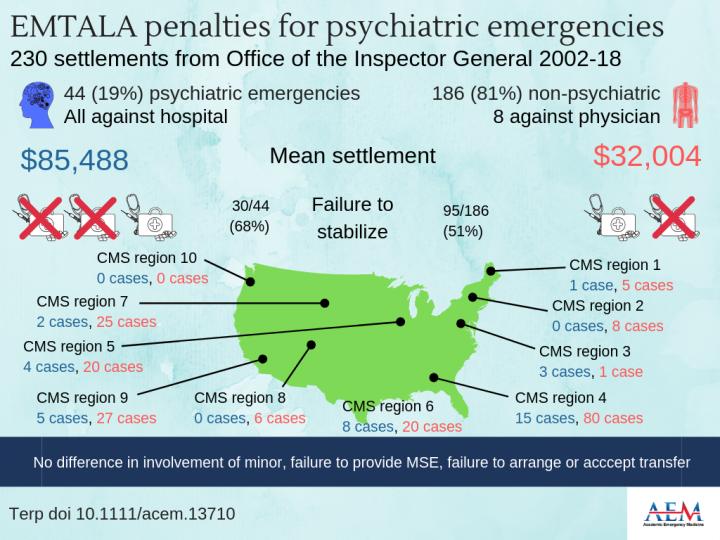
Credit: KIRSTY CHALLEN, B.SC., MBCHB, MRES, PH.D., LANCASHIRE TEACHING HOSPITALS, UNITED KINGDOM
DES PLAINES, IL — Nearly one in five civil monetary penalty settlements related to Emergency Medical Treatment and Labor Act (EMTALA) violations involved psychiatric emergencies. That is the conclusion of a study to be published in the May 2019 issue of ACADEMIC EMERGENCY MEDICINE (AEM), a journal of the Society for ACADEMIC EMERGENCY MEDICINE (SAEM). Settlements related to psychiatric emergencies were costlier and more often associated with failure to stabilize than for nonpsychiatric emergencies.
The lead author of the study is Sophie Terp, MD, MPH, assistant professor of clinical emergency Medicine, Keck School of Medicine, University of Southern California, Los Angeles, CA.
The research suggests that administrators should evaluate and strengthen policies and procedures related to psychiatric screening examinations, stabilizing care of psychiatric patients boarding in emergency departments, and transfer policies.
According to Terp, et al., recent large, notable settlements related to EMTALA violations suggest that there is considerable room to improve access to and quality of care for patients with psychiatric emergencies.
Commenting on the study is Matt C. Innes, in-house counsel for Integrative Emergency Services (IES) Healthcare:
“This is an important read for emergency department physician group leaders and hospital leaders. This article offers critical insight on an emerging issue in the emergency department and prompts discussion on how to best prepare for treatment of psychiatric patients to comply with EMTALA obligations.”
###
ABOUT ACADEMIC EMERGENCY MEDICINE
ACADEMIC EMERGENCY MEDICINE, the monthly journal of Society for ACADEMIC EMERGENCY MEDICINE, features the best in peer-reviewed, cutting-edge original research relevant to the practice and investigation of emergency care. The above study is published open access and can be downloaded by following the DOI link: 10.1111/acem.13710. Journalists wishing to interview the authors may contact Stacey Roseen at [email protected].
ABOUT THE SOCIETY FOR ACADEMIC EMERGENCY MEDICINE
SAEM is a 501(c)(3) not-for-profit organization dedicated to the improvement of care of the acutely ill and injured patient by leading the advancement of ACADEMIC EMERGENCY MEDICINE through education and research, advocacy, and professional development. To learn more, visit saem.org.
Media Contact
Stacey Roseen
[email protected]
Related Journal Article
http://dx.




